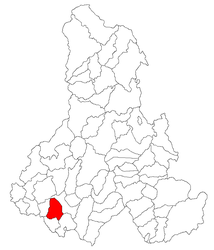Mugeni (Hungarian: Bögöz [ˈbøɡøz]) is a commune in Harghita County, Romania. It lies in the Székely Land, an ethno-cultural region in eastern Transylvania.
Mugeni
Bögöz | |
|---|---|
 The Reformed church | |
 Location in Harghita County | |
| Coordinates: 46°15′N 25°13′E | |
| Country | Romania |
| County | Harghita |
| Government | |
| • Mayor (2020–2024) | Zoltán Ülkei[1] (UDMR) |
| Area | 65.30 km2 (25.21 sq mi) |
| Elevation | 441 m (1,447 ft) |
| Population (2021-12-01)[2] | 3,329 |
| • Density | 51/km2 (130/sq mi) |
| Time zone | EET/EEST (UTC+2/+3) |
| Postal code | 537205 |
| Area code | +40 266 |
| Vehicle reg. | HR |
| Website | bogozkozseg |
The commune is located in the southwestern part of the county, 9 km (5.6 mi) from Odorheiu Secuiesc and 57 km (35 mi) from the county seat, Miercurea Ciuc.
Component villages
The commune is composed of eight villages:
| In Romanian | In Hungarian | First recorded | Pop.(2002) |
|---|---|---|---|
| Aluniș | Székelymagyaros | In 1566 as Mogijoros | 143 |
| Beta | Béta | In 1566 as Beta | 304 |
| Dejuțiu | Décsfalva | In 1566 as Dechfalva | 200 |
| Dobeni | Székelydobó | In 1334 as Dobov | 587 |
| Lutița | Agyagfalva | In 1506 as Agyagfalva | 760 |
| Mătișeni | Mátisfalva | In 1567 as Mattijwsffalwa | 128 |
| Mugeni | Bögöz | In 1333 as Bugus | 1042 |
| Tăietura | Vágás | In 1334 as Voygias | 296[3] |
In 2004, the villages of Porumbenii Mari and Porumbenii Mici formed the commune of Porumbeni (Nagygalambfalva). The village of Betești (Betfalva) was transferred to the town of Cristuru Secuiesc that year.
History
The villages forming the present-day commune were part of the Székely Land region of the historical Transylvania province. They belonged to Csíkszék district until the administrative reform of Transylvania in 1876, when they fell within the Csík County in the Kingdom of Hungary. In the aftermath of World War I and the Hungarian–Romanian War of 1918–1919, it passed under Romanian administration; after the Treaty of Trianon of 1920, like the rest of Transylvania, it became part of the Kingdom of Romania. During the interwar period, the locality fell within plasa Odorhei of Odorhei County. In 1940, the Second Vienna Award granted Northern Transylvania to Hungary and the village was held by Hungary until 1944. After Soviet occupation, the Romanian administration returned and the village became officially part of Romania in March 1945. Between 1952 and 1960, the commune fell within the Magyar Autonomous Region, between 1960 and 1968 the Mureș-Magyar Autonomous Region. In 1968, the region was abolished, and since then, the commune has been part of Harghita County.
Demographics
The commune has an absolute Hungarian (Székely) majority. According to the 2002 census, it had a population of 3,460, of which 98.82% were Hungarians.[4] At the 2011 census, there were 3,491 inhabitants, of which 97.05% were Hungarians. At the 2021 census, Mugeni had a population of 3,329; of those, 91.35% were Hungarians and 1.17% Roma.[5]
Notable people
- Imre Palló (1891–1978), leading baritone at the Budapest State Opera
- Lajos Gidófalvy (1901–1945), military officer, antifascist activist
- János Kardalus (1935–2006), ethnographer
Gallery
- Josephinische Landaufnahme, 1769-1773
- Josephinische Landaufnahme, 1769-1773
References
External links
Wikiwand in your browser!
Seamless Wikipedia browsing. On steroids.
Every time you click a link to Wikipedia, Wiktionary or Wikiquote in your browser's search results, it will show the modern Wikiwand interface.
Wikiwand extension is a five stars, simple, with minimum permission required to keep your browsing private, safe and transparent.



